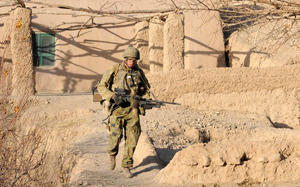
Your complimentary articles
You’ve read one of your four complimentary articles for this month.
You can read four articles free per month. To have complete access to the thousands of philosophy articles on this site, please
Books
In Defence of War by Nigel Biggar
David McKay looks at arguments about when war might be justified.
What are we to make of In Defence of War (2013) by Nigel Biggar, Regius Professor of Moral and Pastoral Theology at the University of Oxford? The title itself is provocative: to the pacifist there is nothing significant to be said in defence of war and the pages should be blank. Some might suspect the book of being an apology for neoconservative attempts to impose ‘democracy’ (i.e. free market capitalism) on unwilling nations at the point of a big gun. Others may hope for a rehabilitation of some of the ‘great men’ of history, whose reputations have been trashed in the name of political correctness. Neither of these expectations is warranted. What Biggar offers is a series of essays which seek to apply certain basic principles regarding war. These he sets out in his Introduction, which is subtitled ‘Against the virus of wishful thinking’. It is to this Introduction that I will give most attention, since its perspective underlies everything that follows.

The archetypal soldier-saint in action
This book is a very personal apologia. Biggar begins by acknowledging that peace, not war, should have first claim on our attention, and that working to prevent the outbreak of war is our first and most urgent duty. However, as he puts it, “I do not have it in me to write a book about peace” (p.1). He reveals that war has always captured his imagination, recalls relatives who died in war, and wonders both how he would have dealt with the things they experienced, and how his Christian faith would have coped. The result is “another book on the moral justification of war.” There can be little doubt about where he proposes to take his readers.
Biggar seeks to apply the principles which have come to be designated ‘just war thinking’ to various conflicts, including the First World War (the Battle of the Somme in particular), the intervention of NATO in Kosovo in 1999, and the invasion of Iraq in 2003. He makes the necessary distinction between justice in going to war (ius ad bellum) and justice in the course of fighting a war (ius in bello), and sets out the six criteria for justice in going to war: just cause, legitimate authority, right intention, last resort, proportionality, and prospect of success. This perspective provides the framework of principles within which Biggar aims to work, giving this disparate collection of pieces a degree of coherence as a study of war, particularly in its modern manifestations.
It is important to note Biggar’s clarification of his commitment to the just war position. He states, “By ‘just war’ I do not refer to war that is simply or perfectly just; and I certainly do not refer to a war that is holy. ‘Just’ here means ‘justified’ – on balance and all things considered. No war waged by human beings will ever be simply just; but that is not to say that no war can ever be justified” (p.3). As a theologian he also argues that all wars are waged by one set of sinners against another, and so no war can be considered ‘holy’ – the sort of war that, as Biggar says, “carries with it a divine carte blanche” (p.4). Biggar also recognises that, as a theologian, his cultural context is significantly shaped by pacifist views. He argues, however, that there is not always a pacifist solution to conflict, and that perpetrators of grave injustice cannot always be deflected from the path of violence by patient reasoning. He thus defends what he terms the ‘realist tradition’ in opposition to contemporary pacifism.
This position, says Biggar, is Christian, not Hobbesian: his lack of optimism regarding human nature does not entail the pessimism or cynicism found in Thomas Hobbes’ (1588-1679) philosophy. His position is summed up in this way: “Human beings are capable of loving what is good and doing what is right, sometimes with heroic courage. Equally, however, they are capable of becoming so wedded to evil that sweet reason, for all its patience, cannot detach them” (p.12). This anthropological realism is joined to a moral realism which asserts a fundamental moral unity and order in the world derived from God and not humanity. So in regard to war, Biggar holds that international law cannot be the final court of moral appeal. Therefore Christian realism must, in Biggar’s view, follow the great Church Father, St Augustine (354-430), in arguing that the use of violent force can be a form of ‘kind harshness’ (p.13). But Biggar should not be painted as a crusading warmonger. He acknowledges that war involves horrendous evils which should be avoided if possible. As the later chapters show, he fully recognises, so far as a non-combatant can, the various kinds of suffering that war entails. Nevertheless, he asserts, “As I believe in the fact of gross and intractable wickedness, so I believe that punishment is necessary and that it has a basic, broadly retributive dimension. Retribution is important because wrongdoing needs to be contradicted, fended off, and reversed. Not to contradict it and fend it off and try to reverse it is to imply that it does not matter and, therefore, that its victims do not matter” (p.11). Such retribution, he qualifies, is not necessarily vengeful: there is such a thing as a proportionate response to wrongdoing.
Everything else in the book depends on the principles for which he has argued in the Introduction. Chapter 1 is entitled ‘Against Christian Pacifism’, and engages critically with three of the main proponents of a pacifist position, Stanley Hauerwas, John Howard Yoder, and Richard Hays. Here Biggar demonstrates in detail why he rejects the various pacifist options they espouse.
Chapter 2 deals with ‘Love in War’. Here Biggar puts forward several controversial positions. In considering reconciliation, he argues that there are two ‘moments’ of forgiveness: compassion, which is unilateral and unconditional; and absolution, which is dependent on the perpetrator’s repentance. These moments should not be confused. He contends further that resentment may be an appropriate response to harm, and that retribution need not be vengeful. Soldiers, he argues, often kill an enemy out of love for their own comrades rather than out of hatred for their opponents, and indeed, civilians may well hate the enemy more than do frontline soldiers. But even rage and hatred may be appropriate on the battlefield, as it may be a morally fitting response to despicable deeds, grounded in a love of justice (p.88).

Australian soldier in Afghanistan by SPC Jonathan Thomas 2010
The third chapter asks if the principle of double effect can survive combat, and responds that it can. This principle states that it’s sometimes morally permissible to cause a harm as a side effect of bringing about a good result, even though it would not be permissible to cause that same harm as a means to bringing about the same result. Biggar believes that intention is a crucial moral factor in evaluating war, and with Aquinas (1225-1274), he affirms that not all intentional killing is necessarily wrong. On occasion, one may “choose and accept [killing] with reluctance” (p.110), and in some justifiable cases the associated evil is unavoidable.
Specific conflicts provide the material for Chapters 4, 6 and 7. In Chapter 4, ‘Proportionality’, Biggar demonstrates his willingness to support positions that many would reject when he argues at length with reference to the Battle of the Somme that “it was terribly and tragically managed by imperfect generals. But it was not criminally careless, nor was it futile” (p.146). He asks what the alternatives to the Somme offensive were. For example, should Britain have made peace earlier, and on what terms offered by Germany? He also argues that attritional warfare is not necessarily disproportionate. Chapter 5, ‘Against legal positivism and liberal individualism’, engages in detail with the views of David Rodin in War and Self-Defense (2002). The conflict in Kosovo is the subject of Chapter 6, ‘On not always giving the Devil the benefit of law: Legality, morality, and Kosovo’; while the NATO intervention in Iraq is dealt with in Chapter 7, ‘Constructing judgement: The case of Iraq’.
In Defence of War tackles a multiplicity of issues relating to war, reflected in the wide range of sources on which Biggar draws. Some of his positions are, as he well knows, profoundly controversial and will in some readers provoke vigorous, even heated, rejection. But he does argue his case carefully and thoroughly, and generally in a nuanced way, taking account of contrary views. Most readers will disagree with at least some of his conclusions, perhaps at many points; but the challenge is to answer him with the same thoroughness and rigour with which he affirms his positions. As a defence of the Augustinian Just War tradition, this is a profound and significant contribution to formulating an ethics of war for the twenty-first century.
© David McKay 2019
David McKay is Professor of Systematic Theology, Ethics and Apologetics at the Reformed Theological College, Belfast.
• In Defence of War, by Nigel Biggar, OUP, 2013, 361 pages, £25.99 hb., ISBN 978-0-19-967261-5









